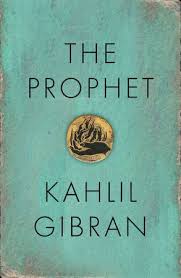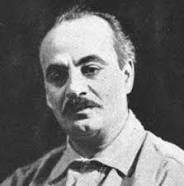The Prophet Page #3
The Prophet is a book of 26 prose poetry fables written in English by the Lebanese-American poet and writer Kahlil Gibran. It was originally published in 1923 by Alfred A. Knopf. It is Gibran's best known work.
“By the same power that slays you, I too am slain; and I too shall be consumed. 28For the law that delivered you into my hand shall deliver me into a mightier hand. Your blood and my blood is naught but the sap that feeds the tree of heaven.” And when you crush an apple with your teeth, say to it in your heart, “Your seeds shall live in my body, And the buds of your tomorrow shall blossom in my heart, And your fragrance shall be my breath, And together we shall rejoice through all the seasons.” And in the autumn, when you gather the grapes of your vineyards for the winepress, say in your heart, “I too am a vineyard, and my fruit shall be gathered for the winepress, And like new wine I shall be kept in eternal vessels.” And in winter, when you draw the wine, 29let there be in your heart a song for each cup; And let there be in the song a remembrance for the autumn days, and for the vineyard, and for the winepress. 30Then a ploughman said, Speak to us of Work. And he answered, saying: You work that you may keep pace with the earth and the soul of the earth. For to be idle is to become a stranger unto the seasons, and to step out of life’s procession, that marches in majesty and proud submission towards the infinite. When you work you are a flute through whose heart the whispering of the hours turns to music. Which of you would be a reed, dumb and silent, when all else sings together in unison? Always you have been told that work is a curse and labour a misfortune. But I say to you that when you work you fulfil a part of earth’s furthest dream, 31assigned to you when that dream was born, And in keeping yourself with labour you are in truth loving life, And to love life through labour is to be intimate with life’s inmost secret. But if you in your pain call birth an affliction and the support of the flesh a curse written upon your brow, then I answer that naught but the sweat of your brow shall wash away that which is written. You have been told also that life is darkness, and in your weariness you echo what was said by the weary. And I say that life is indeed darkness ‘save when there is urge, And all urge is blind save when there is knowledge, And all knowledge is vain save when there is work, And all work is empty save when there is love; And when you work with love you bind 32yourself to yourself, and to one another, and to God. And what is it to work with love? It is to weave the cloth with threads drawn from your heart, even as if your beloved were to wear that cloth. It is to build a house with affection, even as if your beloved were to dwell in that house. It is to sow seeds with tenderness and reap the harvest with joy, even as if your beloved were to eat the fruit. It is to charge all things you fashion with a breath of your own spirit, And to know that all the blessed dead are standing about you and watching. Often have I heard you say, as if speaking in sleep, “He who works in marble, and finds the shape of his own soul in the stone, is nobler than he who ploughs the soil. 33And he who seizes the rainbow to lay it on a cloth in the likeness of man, is more than he who makes the sandals for our feet.” But I say, not in sleep but in the overwakefulness of noontide, that the wind speaks not more sweetly to the giant oaks than to the least of all the blades of grass; And he alone is great who turns the voice of the wind into a song made sweeter by his own loving. Work is love made visible. And if you cannot work with love but only with distaste, it is better that you should leave your work and sit at the gate of the temple and take alms of those who work with joy. For if you bake bread with indifference, you bake a bitter bread that feeds but half man’s hunger. And if you grudge the crushing of the grapes, your grudge distils a poison in the wine. 34And if you sing though as angels, and love not the singing, you muffle man’s ears to the voices of the day and the voices of the night. 35Then a woman said, Speak to us of Joy and Sorrow. And he answered: Your joy is your sorrow unmasked. And the selfsame well from which your laughter rises was oftentimes filled with your tears. And how else can it be? The deeper that sorrow carves into your being, the more joy you can contain. Is not the cup that holds your wine the very cup that was burned in the potter’s oven? And is not the lute that soothes your spirit, the very wood that was hollowed with knives? When you are joyous, look deep into your heart and you shall find it is only that which has given you sorrow that is giving you joy. When you are sorrowful look again in 36your heart, and you shall see that in truth you are weeping for that which has been your delight. Some of you say, “Joy is greater than sorrow,” and others say, “Nay, sorrow is the greater.” But I say unto you, they are inseparable. Together they come, and when one sits alone with you at your board, remember that the other is asleep upon your bed. Verily you are suspended like scales between your sorrow and your joy. Only when you are empty are you at standstill and balanced. When the treasure-keeper lifts you to weigh his gold and his silver, needs must your joy or your sorrow rise or fall. 37Then a mason came forth and said, Speak to us of Houses. And he answered and said: Build of your imaginings a bower in the wilderness ere you build a house within the city walls. For even as you have home-comings in your twilight, so has the wanderer in you, the ever distant and alone. Your house is your larger body. It grows in the sun and sleeps in the stillness of the night; and it is not dreamless. Does not your house dream? and dreaming, leave the city for grove or hilltop? Would that I could gather your houses into my hand, and like a sower scatter them in forest and meadow. Would the valleys were your streets, and the green paths your alleys, that you 38might seek one another through vineyards, and come with the fragrance of the earth in your garments. But these things are not yet to be. In their fear your forefathers gathered you too near together. And that fear shall endure a little longer. A little longer shall your city walls separate your hearths from your fields. And tell me, people of Orphalese, what have you in these houses? And what is it you guard with fastened doors? Have you peace, the quiet urge that reveals your power? Have you remembrances, the glimmering arches that span the summits of the mind? Have you beauty, that leads the heart from things fashioned of wood and stone to the holy mountain? Tell me, have you these in your houses? Or have you only comfort, and the lust for comfort, that stealthy thing that 39enters the house a guest, and then becomes a host, and then a master? Ay, and it becomes a tamer, and with hook and scourge makes puppets of your larger desires. Though its hands are silken, its heart is of iron. It lulls you to sleep only to stand by your bed and jeer at the dignity of the flesh.
Translation
Translate and read this book in other languages:
Select another language:
- - Select -
- 简体中文 (Chinese - Simplified)
- 繁體中文 (Chinese - Traditional)
- Español (Spanish)
- Esperanto (Esperanto)
- 日本語 (Japanese)
- Português (Portuguese)
- Deutsch (German)
- العربية (Arabic)
- Français (French)
- Русский (Russian)
- ಕನ್ನಡ (Kannada)
- 한국어 (Korean)
- עברית (Hebrew)
- Gaeilge (Irish)
- Українська (Ukrainian)
- اردو (Urdu)
- Magyar (Hungarian)
- मानक हिन्दी (Hindi)
- Indonesia (Indonesian)
- Italiano (Italian)
- தமிழ் (Tamil)
- Türkçe (Turkish)
- తెలుగు (Telugu)
- ภาษาไทย (Thai)
- Tiếng Việt (Vietnamese)
- Čeština (Czech)
- Polski (Polish)
- Bahasa Indonesia (Indonesian)
- Românește (Romanian)
- Nederlands (Dutch)
- Ελληνικά (Greek)
- Latinum (Latin)
- Svenska (Swedish)
- Dansk (Danish)
- Suomi (Finnish)
- فارسی (Persian)
- ייִדיש (Yiddish)
- հայերեն (Armenian)
- Norsk (Norwegian)
- English (English)
Citation
Use the citation below to add this book to your bibliography:
Style:MLAChicagoAPA
"The Prophet Books." Literature.com. STANDS4 LLC, 2025. Web. 22 Feb. 2025. <https://www.literature.com/book/the_prophet_240>.








Discuss this The Prophet book with the community:
Report Comment
We're doing our best to make sure our content is useful, accurate and safe.
If by any chance you spot an inappropriate comment while navigating through our website please use this form to let us know, and we'll take care of it shortly.
Attachment
You need to be logged in to favorite.
Log In